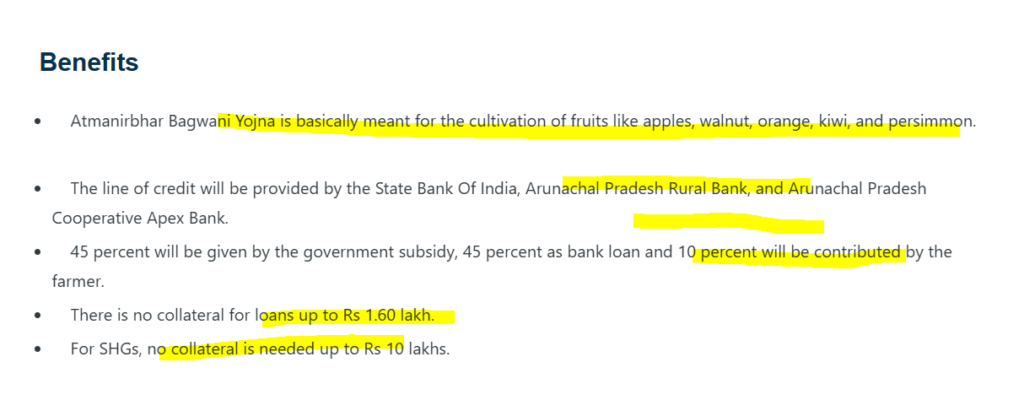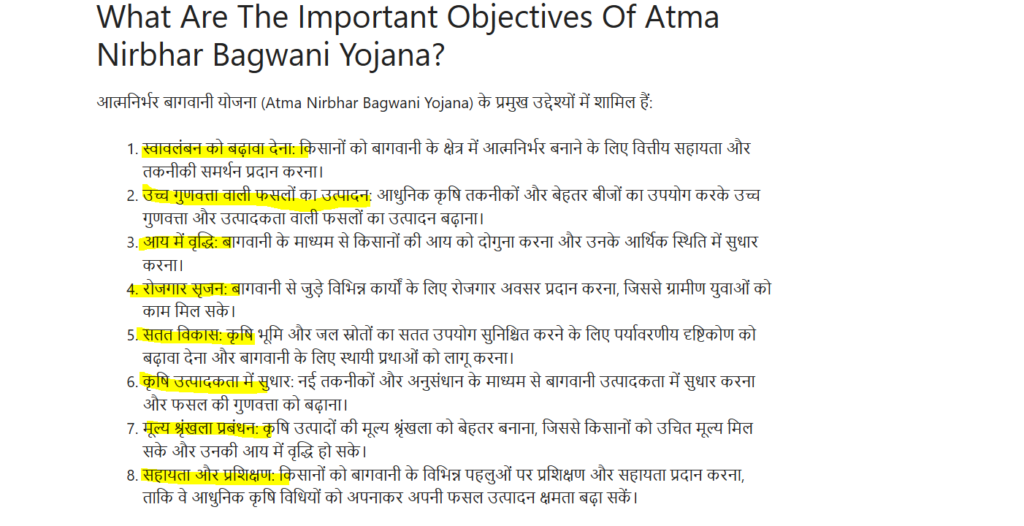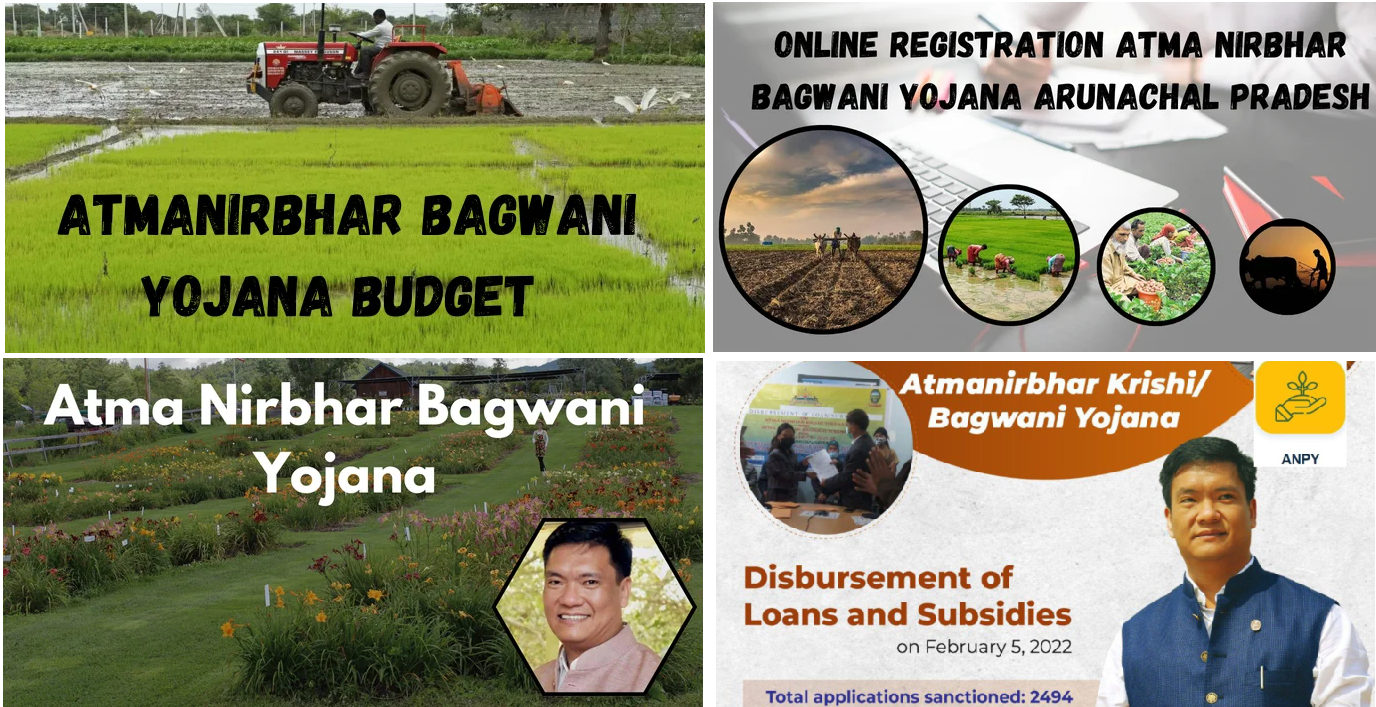Atma Nirbhar Bagwani Yojana is a government scheme launched to encourage self-reliance in horticulture and promote sustainable agriculture practices, especially in rural areas. “Atma Nirbhar” translates to “self-reliant,” and “Bagwani” means “horticulture.” The scheme generally aims to empower small and marginal farmers by providing them with resources, training, and financial assistance for starting or improving horticulture practices, such as growing vegetables, fruits, and flowers.
Key Features
- Financial Assistance: The government provides subsidies or low-interest loans to support farmers in setting up horticulture projects.
- Training and Skill Development: Farmers receive training in modern horticulture techniques, organic farming, efficient water usage, and soil health improvement.
- Infrastructure Support: Provision for greenhouses, polyhouses, drip irrigation systems, and other infrastructure essential for efficient horticulture.
- Promotion of Organic and Sustainable Practices: Focus on reducing chemical use and adopting organic and sustainable practices, improving both yield and environmental health.

Benefits
- Economic Growth: Helps farmers boost their income by diversifying their crops and focusing on high-value horticultural produce.
- Employment Generation: The scheme creates job opportunities in rural areas, reducing migration to urban centers.
- Sustainable Agriculture: By promoting sustainable and organic farming practices, the scheme supports long-term ecological balance.
- Food Security: Increases the availability of fruits, vegetables, and other produce, enhancing food security.
Eligibility and Application Process
- Eligibility: Small and marginal farmers, particularly those in rural or semi-urban areas, are usually eligible. Other criteria may include residency, land ownership, and experience.
- Application Process: Farmers can apply through local agricultural departments or specific portals established by state governments for the scheme.
The Atma Nirbhar Bagwani Yojana is part of India’s broader effort to strengthen the agricultural sector and encourage self-sufficiency.
The Atma Nirbhar Bagwani Yojana (Self-Reliant Horticulture Scheme) is an initiative by the Government of India aimed at promoting self-sufficiency in horticulture. This scheme encourages individuals and communities to cultivate fruits, vegetables, and medicinal plants to improve local food security, enhance nutritional intake, and boost rural livelihoods.
Key Objectives:
- Promote Local Cultivation: Encourage people, particularly in rural areas, to cultivate their own food, reducing dependence on external markets.
- Improve Nutritional Security: Provide access to fresh, organic produce to improve the nutritional intake of households.
- Generate Employment: Through horticultural activities, the scheme aims to create job opportunities and supplement rural incomes.
- Sustainable Farming Practices: Promote organic and sustainable methods for cultivation, preserving soil health and biodiversity.
Features:
- Subsidies and Grants: Financial assistance to help set up small-scale horticultural gardens.
- Training and Support: Governmental bodies provide training on best practices, such as soil management, crop rotation, and organic pest control.
- Infrastructure Development: Support for irrigation facilities, seed supplies, and other resources.
- Focus on Medicinal Plants: Besides fruits and vegetables, the scheme also encourages the cultivation of medicinal plants, which have high market demand and health benefits.
Eligibility and How to Apply:
- Individuals, farmers, and communities, especially from rural areas, are eligible to apply.
- Applications can be submitted through local agriculture departments or government online portals.
The Atma Nirbhar Bagwani Yojana is part of India’s broader “Atmanirbhar Bharat Abhiyan” (Self-Reliant India Mission), reflecting the goal of strengthening local economies and empowering individuals through sustainable agriculture.
Atma Nirbhar Bagwani Yojana (Self-Reliant Gardening Scheme) is an initiative by the Indian government aimed at promoting self-sufficiency in agriculture by encouraging individuals, households, and communities to grow their own vegetables, fruits, and other essential plants. This scheme, primarily targeting rural and semi-urban areas, encourages small-scale, organic farming methods to boost local food production, reduce dependency on external markets, and support sustainable agriculture.
Key objectives of the scheme include:
- Food Security: By enabling people to grow their own food, the scheme reduces reliance on the market, enhancing household-level food security.
- Promotion of Organic Farming: The scheme emphasizes using organic and sustainable farming practices, improving soil health, and minimizing environmental impact.
- Economic Benefits: By reducing food expenses and potentially creating a surplus that can be sold, it can improve household income.
- Capacity Building: Training is provided in areas like seed selection, plant care, soil management, and organic pest control, often with workshops or farmer collectives.
The scheme offers various supports, including seed kits, gardening tools, organic fertilizers, and guidance on building terrace gardens or backyard farms. Some regions may also provide financial subsidies to cover initial setup costs for eligible participants.
The Atma Nirbhar Bagwani Yojana (Self-Reliant Gardening Scheme) is an initiative by the Government of Arunachal Pradesh, India, to encourage self-sufficiency in horticulture and vegetable production among local farmers. The scheme aims to promote sustainable agriculture, support local farmers in growing their produce, and reduce dependency on external sources. Here are the main aspects of the scheme:
Key Objectives
- Encouraging Self-Reliance in Horticulture: The scheme supports farmers to grow horticultural crops locally, helping to meet regional food demands.
- Boosting Employment: By promoting agricultural activities, the scheme creates job opportunities and livelihood sources for rural communities.
- Promoting Sustainable Agriculture: Emphasis on eco-friendly and sustainable agricultural practices to ensure environmental conservation.
- Enhancing Income Levels: The scheme aids farmers in increasing their income by reducing production costs and selling their produce locally.
Main Features
- Financial Assistance: The government provides financial assistance to farmers for buying seeds, tools, fertilizers, and other necessary supplies.
- Technical Support and Training: The scheme offers training programs to farmers, focusing on modern horticulture practices, pest control, and organic farming.
- Subsidies and Loans: Eligible farmers can access subsidies and soft loans to help cover the costs of setting up and maintaining gardens.
- Targeted Crops: Farmers are encouraged to grow a variety of vegetables, fruits, spices, and other high-value crops suited to the region’s climate.
Eligibility and Application
The scheme is primarily open to small and marginal farmers, women self-help groups (SHGs), and young agripreneurs interested in horticulture. Interested individuals can apply through the state’s agricultural department or its official portal.
This scheme aligns with India’s broader Atmanirbhar Bharat (Self-Reliant India) vision by focusing on empowering local communities and reducing dependency on imports for essential food items.



